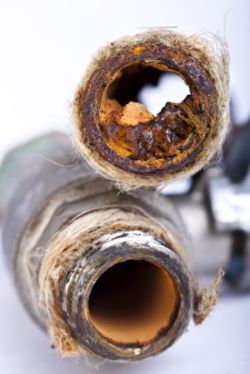Corrosion Technology

This program prepares students for entry-level employment as a Corrosion Technician in the fields of manufacturing, oil & gas, government, pipeline maintenance and general corrosion management. Students will learn in state-of-the-art industry labs and classroom settings using industry recognized equipment.
Corrosion Technology includes energy infrastructure, transportation systems, national defense and more. A successful corrosion technician installs, maintains, inspects, troubleshoots facilities and documents issues with as many details as possible. Corrosion repair defects can be solved faster — with less equipment down time — with proper documentation of the resolution process. Future repairs can be avoided with preventative maintenance administered by the technician, based on past documented problems.
Corrosion Technicians have a basic understanding of electricity, chemistry, metallurgy and the properties of materials. Careers in corrosion apply these sciences to detect and control chemical and mechanical deterioration. Corrosion Technicians work both indoors and outdoors installing, maintaining, inspecting and troubleshooting all sorts of facilities such as pipelines, storage tanks, building components, industrial equipment, airplanes, ships, railcars, etc. Corrosion technicians may specialize in coating inspection, cathodic protection (use of electricity to control corrosion), chemical inhibition, material selection, or design to control the corrosion processes.
For more information about this program and plan of study, please refer to the current catalog.
-
Degree & Certificate Options
Associate of Applied Science
The two-year Associate of Applied Science prepares students to sit for National Association of Corrosion Engineers (NACE) exams. The AAS option also includes a capstone project and internship experience.
Program Outcomes
- Utilize basic knowledge of mathematics, electricity, chemistry, physics, metallurgy and the properties of materials to prevent or control corrosion
- Apply corrosion theory to prevent, assess and correct corrosion problems
- Install, maintain, inspect, troubleshoot and remedy corrosion problems
- Adhere to safe work practices and ensure compliance with company and regulatory requirements pertaining to corrosion applications
- Identify and address electrical reactions
- Identify and safely use cathodic testing equipment
- Identify and apply coatings and linings
- Interpret, produce and explain technical reports and perform field surveys
Certificate of Applied Science
The one-year Certificate of Applied Science prepares students for entry-level employment as a Corrosion Technician. Students will learn in industry labs and classroom settings using industry recognized equipment while preparing to sit for the National Association of Corrosion Engineers (NACE) certification exams.
Program Outcomes
- Utilize basic knowledge of mathematics, electricity, chemistry, metallurgy and the properties of materials to prevent or control corrosion
- Apply basic corrosion theory to prevent, assess and correct corrosion problems
- Adhere to safe work practices and ensure compliance with company and regulatory requirements pertaining to corrosion applications
- Identify and safely use cathodic testing equipment
- Identify and apply coatings and linings
Certificate of Technical Studies
Students have the option of earning a Certificate of Technical Studies after each semester by completing program-specific courses. This allows students to earn a credential after just one semester and allows for a more skilled workforce.
| Suggested Courses | Credits | |
|---|---|---|
| BMGT237 | Human Relations in Business | 3 |
| CAPP131 | Basic MS Office | 3 |
| CORR101 | Safety | 1 |
| CORR102 | Intro to Corrosion | 3 |
| CORR103 | DC Circuits | 3 |
| CORR104 | Coatings and Linings | 3 |
| CORR105 | Electricity, Electrical Reactions | 3 |
| CORR106 | Cathodic Protection | 4 |
| CORR107 | Corrosion Technology | 4 |
| CORR208 | Rectifiers | 3 |
| CORR209 | Internal Corrosion Control | 4 |
| CORR210 | Diagrams, Schematics, GIS | 4 |
| CORR213 | Metallurgy and Corrosion | 3 |
| CORR214 | Atmospheric Corrosion | 3 |
| CORR215 | Field Surveys | 4 |
| CORR216 | Capstone Project | 4 |
| CORR292 | Independent Study or | 3 |
| CORR298 | Internship | 3 |
| M111 | Technical Math | 3 |
| WRIT101 | College Writing I | 3 |
Explore the Dawson Community College catalog for course descriptions.



